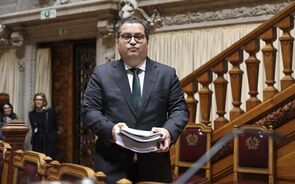New debt fears jolt markets as Greece asks for first aid
1 Mensagem
|Página 1 de 1
New debt fears jolt markets as Greece asks for first aid
link: http://business.asiaone.com/Business/Ne ... 15652.html
New debt fears jolt markets as Greece asks for first crisis aid
Tue, May 11, 2010
ATHENS, GREECE - The Greek government on Tuesday sought the first payment from an international bailout as renewed doubts that Europe's trillion dollar war chest will stave off a major debt crisis punctured market euphoria.
Stock markets in Asia and Europe fell and the euro came down from Monday highs amid worries that despite the huge rescue sums lined up, Greece and other debt-burdened countries will not follow through with tough austerity measures.
The Greek government was to ask the European Union and International Monetary Fund for a first injection of 20 billion euros (26 billion dollars) from a 110-billion-euro bailout package to help it make debt payments this month, a finance ministry source said.
The request came a day after the Greek government ordered a radical overhaul of the country's costly pension system that it has warned faces imminent collapse. But unions vowed to oppose the plan, which would see an average pension cut of seven percent by 2030.
After major rises on Monday in reaction to the 750-billion-euro (one trillion-dollar) EU-IMF fund set up to help debt stricken European nations, stock markets slumped at the start of trading on Tuesday. The London, Frankfurt and Paris markets were all down more than 1.5 percent. In Asia, Tokyo, Sydney and Hong Kong all close down by more than 1.1 percent.
The euro, which briefly jumped above 1.30 dollars on Monday, lost steam against other major currencies and was at 1.2718 dollars in Tokyo afternoon trade.
Major governments have expressed optimism that the 750 billion euros set aside by the European Union and International Monetary Fund has ended the risk of a new debt crisis enveloping the global economy.
US White House spokesman Robert Gibbs said President Barack Obama and his economic team were happy so far with Europe's action. 'We are pleased thus far with that result,' Gibbs commented.
But market and analyst doubts have grown as everyone waits for Greece to take promised action to cut its 13.6 percent public deficit and for Portugal and Spain to announce their measures to slash spending.
'As the dust settles from yesterday's shock and awe bailout package from the eurozone, the realisation that this is a sticking plaster to a much deeper rooted problem has slowly permeated through and the euro has given up most of yesterday's gains,' said CMC Markets analyst Michael Hewson in London.
He added that an announcement by the Moody's ratings agency that it may lower Greece and Portugal's ratings shortly also 'weighed heavily on the euro.'
'The European rescue programme raises a huge number of questions, including whether injection of funds into troubled European countries along with stringent conditions for those loans will result in huge changes in the government fiscal programmes,' said Frederic Dickson, chief market strategist for D.A. Davidson in New York.
Patrick O'Hare, chief market analyst for Briefing Research in New York, called the EU fund a 'stunning move' but added that the 'loan package goes to show just how foolish European officials were in dealing with the sovereign debt issue.'
'Recall that they thought initially things could be contained with a simple declarative statement alone that they stood behind Greece.'
European leaders such as Germany's Chancellor Angela Merkel have supported the EU-IMF package but called for strong action by the countries with high debt.
Belgium's Finance Minister Didier Renders said Tuesday that the debt-burdened countries had to cut spending and boost competitivity.
'The focus of the efforts must be targeted at structural reforms not just the budget,' Reynders told Le Soir newspaper in an interview.
Meanwhile Japan announced that it will limit the amount of debt it issues in the next fiscal year given the heightened market sensitivity. 'Everybody is growing sensitive to sovereign risk' after Greece's debt crisis rocked global markets, Finance Minister Naoto Kan told reporters.
After decades of heavy stimulus spending and declining tax revenues, Japan has a public debt mountain bigger than any other industrialised nation, expected to hit 200 percent of gross domestic product in the next year.
With around 95 percent of Japanese government bonds bought by domestic investors, officials reject comparisons with Greece but scrutiny is increasing.
New debt fears jolt markets as Greece asks for first crisis aid
Tue, May 11, 2010
ATHENS, GREECE - The Greek government on Tuesday sought the first payment from an international bailout as renewed doubts that Europe's trillion dollar war chest will stave off a major debt crisis punctured market euphoria.
Stock markets in Asia and Europe fell and the euro came down from Monday highs amid worries that despite the huge rescue sums lined up, Greece and other debt-burdened countries will not follow through with tough austerity measures.
The Greek government was to ask the European Union and International Monetary Fund for a first injection of 20 billion euros (26 billion dollars) from a 110-billion-euro bailout package to help it make debt payments this month, a finance ministry source said.
The request came a day after the Greek government ordered a radical overhaul of the country's costly pension system that it has warned faces imminent collapse. But unions vowed to oppose the plan, which would see an average pension cut of seven percent by 2030.
After major rises on Monday in reaction to the 750-billion-euro (one trillion-dollar) EU-IMF fund set up to help debt stricken European nations, stock markets slumped at the start of trading on Tuesday. The London, Frankfurt and Paris markets were all down more than 1.5 percent. In Asia, Tokyo, Sydney and Hong Kong all close down by more than 1.1 percent.
The euro, which briefly jumped above 1.30 dollars on Monday, lost steam against other major currencies and was at 1.2718 dollars in Tokyo afternoon trade.
Major governments have expressed optimism that the 750 billion euros set aside by the European Union and International Monetary Fund has ended the risk of a new debt crisis enveloping the global economy.
US White House spokesman Robert Gibbs said President Barack Obama and his economic team were happy so far with Europe's action. 'We are pleased thus far with that result,' Gibbs commented.
But market and analyst doubts have grown as everyone waits for Greece to take promised action to cut its 13.6 percent public deficit and for Portugal and Spain to announce their measures to slash spending.
'As the dust settles from yesterday's shock and awe bailout package from the eurozone, the realisation that this is a sticking plaster to a much deeper rooted problem has slowly permeated through and the euro has given up most of yesterday's gains,' said CMC Markets analyst Michael Hewson in London.
He added that an announcement by the Moody's ratings agency that it may lower Greece and Portugal's ratings shortly also 'weighed heavily on the euro.'
'The European rescue programme raises a huge number of questions, including whether injection of funds into troubled European countries along with stringent conditions for those loans will result in huge changes in the government fiscal programmes,' said Frederic Dickson, chief market strategist for D.A. Davidson in New York.
Patrick O'Hare, chief market analyst for Briefing Research in New York, called the EU fund a 'stunning move' but added that the 'loan package goes to show just how foolish European officials were in dealing with the sovereign debt issue.'
'Recall that they thought initially things could be contained with a simple declarative statement alone that they stood behind Greece.'
European leaders such as Germany's Chancellor Angela Merkel have supported the EU-IMF package but called for strong action by the countries with high debt.
Belgium's Finance Minister Didier Renders said Tuesday that the debt-burdened countries had to cut spending and boost competitivity.
'The focus of the efforts must be targeted at structural reforms not just the budget,' Reynders told Le Soir newspaper in an interview.
Meanwhile Japan announced that it will limit the amount of debt it issues in the next fiscal year given the heightened market sensitivity. 'Everybody is growing sensitive to sovereign risk' after Greece's debt crisis rocked global markets, Finance Minister Naoto Kan told reporters.
After decades of heavy stimulus spending and declining tax revenues, Japan has a public debt mountain bigger than any other industrialised nation, expected to hit 200 percent of gross domestic product in the next year.
With around 95 percent of Japanese government bonds bought by domestic investors, officials reject comparisons with Greece but scrutiny is increasing.
- Mensagens: 218
- Registado: 27/10/2008 16:41
1 Mensagem
|Página 1 de 1


